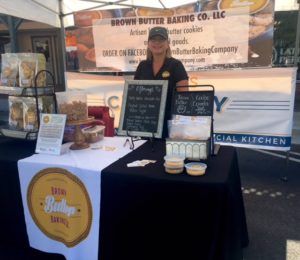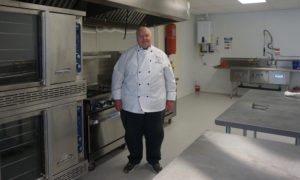
Fresno Metro Ministries used the “What’s Cooking Fresno? Multicultural Cooking Expos” at Manchester Mall in March of 2017 to identify the gaps between entrepreneurs and resources in the food industry. They had more than 500 people over two days. Photo submitted.
When Melissa McKinsey and her husband started Brown Butter Baking Co. more than two years ago, they were limited to whatever they could produce in their home oven.
The Original Brown Butter Salted Sugar Cookies McKinsey brought to her full-time job at a software company were so popular they decided to make a business out of it.
They would sell their cookies at farmer’s markets, including the one in Clovis. But production was limited.

“We got our business license, our tax ID, the only thing we didn’t have was a commercial kitchen,” said Melissa McKinsey, owner of Brown Butter Baking Co..
Now, since the Clovis Culinary Center opened in May, they’ve been able to move out of the restrictions of the rules following the cottage industry guidelines and expand their business.
After Governor Jerry Brown signed the Homemade Food Act of 2012, people were allowed to prepare certain foods for retail sale. It outlined mainly non-perishable foods that could be made at home like jams, jellies, baked goods, and dried teas.
But now, across Fresno County, commercial kitchens like the Clovis Culinary Center and What’s Cooking Fresno through Fresno Metro Ministries saw the need to provide those cooks with the next step before taking the plunge into a brick-and-mortar and are giving them the resources to move beyond their own kitchen.
In Fresno County, there are currently 94 Class A cottage industry permits, which allow people to sell directly to the customer. There are 30 total Class B permits, which allow people to not only sell to the customer, but also to other vendors like grocery stores and coffee shops, according to Mary Jane Day, supervising environmental health specialist at the Fresno County Department of Environmental Health.
While the cottage industry laws were created to help people make a living out of their culinary skills, there were a lot of limitations.
California publishes the list of acceptable foods every January and July, as they update it with items people have suggested they add.
While cakes and cookies are allowed for the most part, things like frosting can be difficult as some kinds can be breeding grounds for microorganisms.
Any finished item that needs refrigeration is for the most part not allowed.
On top of food restrictions, the license also has a cap of $50,000 gross annual income.
These limitations were part of the impetus that Shawn Miller, business development manager for the City of Clovis, saw for creating the 2,500-square-foot non-profit Clovis Culinary Center at Willow and Ashlan avenues.
There, clients have 24-hour access to two full ranges, ovens, prep stations, rinsing stations, freezers, refrigerators, racks of dry storage space and even a $18,000 combioven which can either cooks with moisture or dry—perfect for baguettes. People pay by the hour with memberships for access to the kitchen.

Waddell has a business coming in wanting to start cooking eggrolls, another cooking alcoholic candies and even a woman who wants to bring in a microwave drying appliance from China to dehydrate insects. People wanting to do ice cream and coffee as well as
“We’re not just talking about run-of-the-mill stuff, we expect some R&D folks to come in and work on recipe development,” Waddell said.
On top of the physical resources, Chef Don Waddell, executive director is on hand to aid cooks in the art of commercial cooking. Waddell taught at the Institute of Technology in Clovis as well as directing their culinary program when Miller tapped him to lead the program.
“They felt a nonprofit should exist here for the purpose of being that nexus for folks to get out of their own kitchens and also to bring a lot of people out of the shadows,” said Waddell.
Now, he’s at the Culinary Center of Clovis teaching people how to be efficient in their time.
“We love it. It’s so easy because you can do a lot more production in a shorter amount of time,” said McKinsey. “We figured 20 hours of home production was scaled down to about five hours at the center.”
The amount of baking space allows Brown Butter Baking Company to cook 10 pans of cookies at once where they can sell their up to 80 dozen cookies, according to Waddell.
Cooking out of the center, which is certified by the Department of Health, also allows Brown Butter Baking to ship across the country.
The center is also a space where food can be made and prepared safely. Waddell is certified to teach ServeSafe, which laws across the country require at least one person in an operation to have.
The nonprofit used grant money from the United States Department of Agriculture, funding from the Northern California Community Loan Fund on top of other organizations to build out the space that once housed a Thai restaurant. Now, they’re looking to expand even more. Waddell wants more storage space as well as an additional line of ovens and ranges to accommodate more clients at the same time. Right now, they have about five with even more prospects.
At the same time as Clovis was developing the culinary kitchen, Fresno Metro Ministries was developing What’s Cooking Fresno?, an incubator and educational course run with the kitchens and instructors at Fresno Adult School.
With a grant from the Kresge Foundation out of Michigan, Fresno Metro Ministries is currently working on their first cohort of students to introduce them to the food industry.
“What we’re doing with What’s Cooking Fresno is creating a opportunity for individuals with a passion and a dedication to starting food businesses,” said Kelsey McVey, Better Blackstone Community Development Corporation Project Manager at Fresno Metro Ministries.
With an initial planning grant of $75,000, they explored the needs of the community, especially that along Blackstone Avenue and discovered the need to bring people into the food industry—one they thought better inoculated to the growth of online vendors like Amazon than other industries.
After competing against more than other 500 applicants, they were awarded with $200,000 to create a curriculum that will teach individuals how to succeed in the food industry by not only giving access to kitchens, but also to things like education on health rules, relationships with experts in the field and finding funding sources like Community Development Fund Initiatives or the Small Business Administration.
The first classes will run throughout the fall semester with 20 people in the first set of classes. They will spend one day a week getting hands-on training in the kitchen and the other day learning the business of restaurant management like bookkeeping, applying for permits and human resources.
Once the cohort is complete, the hope is to build a kitchen space like the one at Clovis Culinary Center.
Where Arthur’s Toys used to be along Blackstone Avenue and where the Fresno Housing Authority is planning to put in a mixed-use development of 45 units, Fresno Metro Ministries has the right of first refusal to put in a space to house the graduates from the course. There, they can work to take the next step to either bricks-and-mortar, to a food truck or catering company.
“When they’re ready to grow their businesses—as most of them hope to do—they’re able to then come and take the next step to come to a place like this,” Waddell said.








